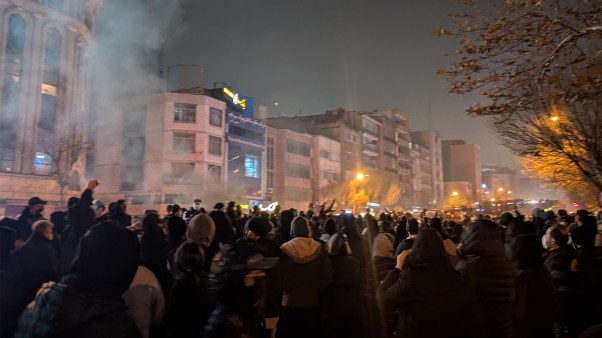Step into the streets of Nazareth, the famed hometown of Jesus, and the smell of garbage overwhelms the senses. Along the streets, trash is piled high on every corner; the city government can no longer pay for trash trucks. Souvenir shops selling cross necklaces and wooden carvings of the Nativity are closed, and the streets of Nazareth’s Old City empty as the Israel-Hamas war has stopped the flow of Christian tourists to the city.
In the past, Christian residents used to use the motto “Come and See” to entice outsiders to visit the city, based on Philip’s answer to his brother Nathanael when the latter asked “Nazareth! Can anything good come from there?” in John 1:46.
Today, many are reluctant for others to see the city in its current state.
The city’s economy has tanked as the war has devastated its tourism industry. Criminal gangs are running rampant in the city, and the municipal government is facing a severe deficit.
The increase in crime the past several years has led droves of residents, many of them Christians, to move to the adjacent Jewish town of Nof HaGalil (previously called “Nazareth Illit”), which receives generous government support. (Predominantly Arab cities like Nazareth have lower standards of living and receive less government funding than predominantly Jewish cities.) Others are moving to Haifa, which has a mixed Arab and Jewish population with a substantial number of Christians.
“People in Nazareth are weary psychologically from the pressures,” said Azar Ajaj, president of Nazareth Evangelical College and pastor of The Local Baptist Church. Christian groups are also facing high taxes. Yet Ajaj and the remaining Christians in Nazareth feel called to continue ministering and seeking revival in the city Jesus once called home.
Located in northern Israel, Nazareth is the largest Arab city in Israel as well as the most Christian city in the country, as a fourth of its 80,800 residents are Christians. For decades, Nazareth was considered the capital of the Arabs in Israel, with thriving markets, a good school system, several Christian hospitals, and famous attractions for Holy Land tours. Hundreds of thousands of Christian tourists visit the Annunciation Roman Catholic Basilica, which has ruins of (presumably) the house of the holy family; Synagogue Church, where Jesus is believed to have read from Isaiah as recorded in Luke 4; and Nazareth Village, a replica of the city as it would have been in the first century.
Yet in recent years, crime within the Arab community has been on the rise, claiming the lives of more than 150 people so far this year. This includes gang wars as well as gang members shooting owners of local businesses who refuse to pay protection money. Research by the Taub Center found that the murder rate in the Arab Israeli community is the third highest in the developing world.
Meanwhile, only about 11 percent of criminal cases are resolved by the police.
Many blame Israel’s far-right minister of national security, Itamar Ben-Gvir, for not putting an end to the widespread violence among Arabs in Israel. Ben-Gvir has in the past made anti-Arab comments, including saying in 2023 that his right to life outweighs Palestinians’ right to travel freely in the West Bank.
Nizar Touma, pastor of the Nazarene Church in Nazareth, noted that one of his congregants who worked as a construction contractor moved away after a criminal gang asked him to pay protection money or they would damage his equipment. The man and his family are seeking to move to the US. They are the second family to leave in the past year, a significant loss to a church of 150.
Meanwhile, since Mayor Ali Sallam came into office in 2014, the city’s deficit has grown to 300 million shekels ($88 million USD) due to mismanagement, corruption, and misconduct, according to Sharif Zoabi, head of the opposition leader in the city council. He said that many departments lacked managers and the city kept hundreds of people on its payroll even though they sat at home or worked elsewhere.
Without funds, paychecks to the city’s employees, including trash truck drivers and security guards, stopped in February, so for months trash piled up on the sides of roads. Residents either rented private trucks to transport waste or burned their trash in their backyards.
As a result, Israel’s minster of interior dismissed the elected mayor of Nazareth, dismantled the city council in June, and appointed a committee of government officials headed by Yaakov Efrati, a retired Jewish official who had served as the general director of the Jerusalem municipality.
In order to fill the city’s empty coffers, the committee demanded that city residents, businesses, and even Christian hospitals and schools pay high taxes. Previously, religious organizations were tax exempt. One school said it had to pay around $250,000 annually, while a Christian hospital said its taxes, which include retroactive payments for the last seven years, total in the millions. The taxes would jeopardize the institution’s existence. Also, several Catholic schools took the committee to court.
“Nazareth municipality’s recent attempt to impose municipal taxes on long-exempt Christian schools is a matter of grave concern,” Farid Jubran, the general director of the Secretariate of Christian Schools in Israel, told CT. “This move undermines the very foundation of Christian education in the city. These schools are not only legally exempt; they are vital to Nazareth’s identity and future, serving thousands of students across communities.”
Touma even received a notice that his church had to pay taxes. When he reached out to the accountant of the municipal committee, the accountant asked Touma to provide evidence that his church was a place of worship, despite the fact that the church had existed for more than a century.
In addition, because Nazareth is in northern Israel, it was a target for missiles last September and October when fighting between Israel and Hezbollah in Lebanon intensified. Then in mid-June, as Israel attacked Iran, Nazareth residents again feared retaliation, running to shelters and safe rooms at the sound of alarms.
“Hearing air raid sirens, the booming sounds of explosions, and realizing you have no control over the situation made me feel a kind of fear,” Ajaj said. “But this very fear drove me to rely on God in faith, remembering that God is above all and that not a single hair from our heads falls without his permission.”
The war has led more and more Nazarenes to move abroad, with Greece and Cyprus being population destinations. A recent Arab Christian transplant to Cyprus told Haaretz that nearly 800 other families have moved to the country, where they have made new lives for themselves running vacation rentals, forming construction firms, establishing factories, or starting restaurants.
Yet the Christians remaining in Nazareth continue to serve. Ajaj noted that since the beginning of the war, his college’s classes have moved completely online. Students from all over Israel and the world are now joining the lectures. “We will hear sirens, and students will leave their screens and rush with their families to safe rooms,” Ajaj noted.
“A lot of our students are pastors themselves who were overloaded with pastoral responsibilities with their congregants, and our lecturers’ jobs converted to be [to giving]encouragement to these students/pastors,” he added.
Touma says that, while pastoring amid wartime is difficult, he sees sharing the hope of Jesus to his hometown as a pressing obligation. He encourages church members to stay in Nazareth and keep walking in the faith through visiting church members and local residents as well as handing out food coupons to the needy.
“I have learned how to sit at the Master’s feet and receive comfort and strength to carry on,” Touma said. “[I’m] hoping that I can get others to do the same.”
The women’s ministry in Ajaj’s church held a prayer meeting for all the Christian women in the city on Annunciation Day, March 25, which is known locally as Nazareth Day. They focused on Jeremiah 29:7: “Seek the peace and prosperity of the city to which I have carried you into exile. Pray to the Lord for it, because if it prospers, you too will prosper.”
Cautious optimism is in the air with the new committee running the municipality.
“I believe that in his timing, the Lord will bring restoration and a revival in his hometown through dedicated men and women from all ages who love Jesus; are well trained; and have a vision for evangelism, bridge building, and expanding the kingdom,” Ajaj said.













